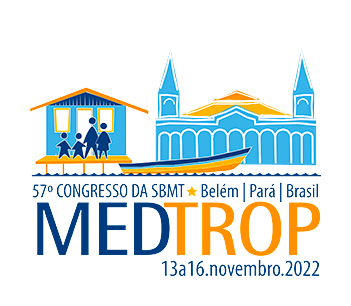Dados do Trabalho
Título
GENETIC DIVERSITY OF PLASMODIUM VIVAX METACASPASE-1 (PvMCA1) IN BRAZILIAN ISOLATES FROM AMAZON FOREST AND THE IMPACT IN THE PROTEIN STRUCTURE
Introdução
Parasite chemoresistance is one of the main obstacles to malaria control and, in this context, it is imperative the identification of parasite proteins that could emerge as therapeutic targets. Recently, the metacaspase family, which was already implicated in the development of parasitic protozoa, has been considered as a potential target. However, polymorphisms in both intronic and catalytic regions of P. vivax metacaspase-1 (PvMCA1) have been identified in non-Brazilian endemic areas and hypothetically could impact the protein structure and activity.
Objetivo(s)
Evaluate the genetic diversity of PvMCA1 in Brazilian endemic areas and the impact in the protein structure
Material e Métodos
P. vivax isolates were obtained from two endemic areas in Brazil (Cruzeiro do Sul/Mâncio Lima – AC and; Manaus – AM) and PvMCA1 polymorphism was studied by DNA sequencing, comparing with P. vivax reference strain from different geographic areas. Isolates from patients presenting recurrent infection were included to evaluate the association between chemoresistance and PvMCA1 diversity. Additionally, molecular modelling was performed to verify the impact of the polymorphisms on the profile of protein structure
Resultados e Conclusão
Three variants (TR1a, TR1b and TR2b) of the intronic region were identified by the presence of one or two repeat units and by the replacement of adenine to guanine in the 10th position of the unit. TR1a was the most prevalent (62.2%), showing complete homology with El Salvador (Sal-1) and China reference strains, while variants with three or four repetitions, detected in other endemic countries, were not observed. Polymorphism of the catalytic domain was not observed in P. vivax isolates herein studied, indicating an absence of relation to recurrent infections. Molecular modelling was performed considering the mutations already described in other endemic countries and no significant change related to the three-dimensional structure was identified, although it was detected alteration in the electrostatic profile of the PvMCA1 region bearing the catalytic site of the protease. Our data indicate a high degree of conservation of the catalytic domain of PvMCA1 in endemic areas of Brazil, which may contribute to the eligibility of this protease as a therapeutic target candidate for malaria caused by P. vivax.
Palavras-chave
Metacaspase; P. vivax; genetic diversity
Área
Eixo 06 | Protozooses
Autores
Hugo Amorim dos Santos de Souza, Carolina Moreira Blanco, Barbara de Oliveira Baptista, Jennifer Peixoto de Barros, Aline Beatriz Mello Rodrigues, Gisely Cardoso de Melo, Rodrigo Medeiro de Souza, Ana Carolina Ramos Guimarães, Claudio Tadeu Daniel-Ribeiro, Lilian Rose Pratt-Riccio, Paulo Renato Rivas Totino
